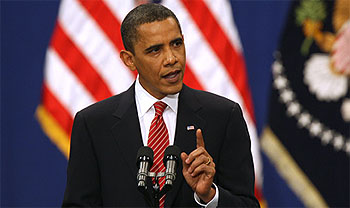 I didn’t hear Obama’s Afghanistan speech in real time, but I did read the transcript and then catch a replay on CSPAN. Overall, I was pretty underwhelmed.
I didn’t hear Obama’s Afghanistan speech in real time, but I did read the transcript and then catch a replay on CSPAN. Overall, I was pretty underwhelmed.
Partly that was just the tone of the speech itself, which was much clunkier than his usual efforts. Take this, for example:
I must weigh all of the challenges that our nation faces. I do not have the luxury of committing to just one. Indeed, I am mindful of the words of President Eisenhower, who — in discussing our national security — said, “Each proposal must be weighed in the light of a broader consideration: the need to maintain balance in and among national programs.”
If you’ve never heard this Eisenhower quote before, there’s a reason for that. Why would you have? It’s about the dryest, least memorable passage you could think of from any president anywhere. It’s positively soporific. Why would you dig up something like this for use in an address designed to rally support for a troop surge?1
Two other problems leaped out as well. First, there was really no discussion of new tactics at all. I didn’t expect much on this score, but at least there should have been something to help convince us that months and months of planning had produced something genuinely new and different. Instead, all we got was this: “I have determined that it is in our vital national interest to send an additional 30,000 U.S. troops to Afghanistan.” That’s pretty lame. There were a few additional words about a civilian surge and a better partnership with Pakistan, but it was brief and pro forma and it’s hard to imagine anyone being persuaded by any of this. Obama really owed it to us to provide at least a sense of why the planning process took so long and how our new strategy will be more effective than the one that hasn’t worked for the past eight years.
Second, most of the speech wasn’t even devoted to the war at all. By my count, only about a third of the address was really about his plan for the war, with the rest meandering around about the danger of al-Qaeda, a potted history of post-9/11 military efforts, and paeans to America’s place in the world. A little bit of that stuff is fine, but this was supposed to be a speech about Afghanistan.
On the substantive side, the good news was Obama’s clear declaration that this would be limited effort and he plans to begin withdrawing the surge troops within 18 months. Conservatives are outraged by this, of course, but look: we’ve been in Afghanistan for eight years. If 100,000+ NATO troops can’t start to turn the tide by 2011, then it’s time to leave. The alternative is to commit to staying forever, and that’s insane. Obama has now given the military everything it needs to succeed, and if they still can’t do it, then they just can’t do it.
Now, whether Obama has the spine to stick to his timeline when 2011 rolls around is a whole ‘nother question. But at least it’s out there. The details are deliberately vague, but it’s out there. The military knows what it has to do; Karzai knows what he has to do; and the country knows what we’ve signed up to do. And the Taliban knows perfectly well that we’re going to leave eventually, so this is hardly news to them.
Overall, I liked Adam Serwer’s take:
It was perhaps his least inspiring speech ever — Obama has been at his most inspiring when he reconciles lofty American aspirations with the reality of American accomplishments and American failures. This speech was Bush-like in its embrace of platitudes and vagueries, it was often the least convincing where once it might have been the most inspiring. It was a speech that reflected the president deciding on what is maybe the least crappy of a number of crappy options — without convincingly explaining how it would work.
There are two possible reasons for the speech being so unconvincing: either Obama doesn’t know how to deliver a good speech or else Obama isn’t really convinced himself. But we know the former isn’t true, don’t we? You can fill in the rest yourself.
1On the other hand, it was apparently Dan Drezner’s favorite part of the speech. Go figure.















